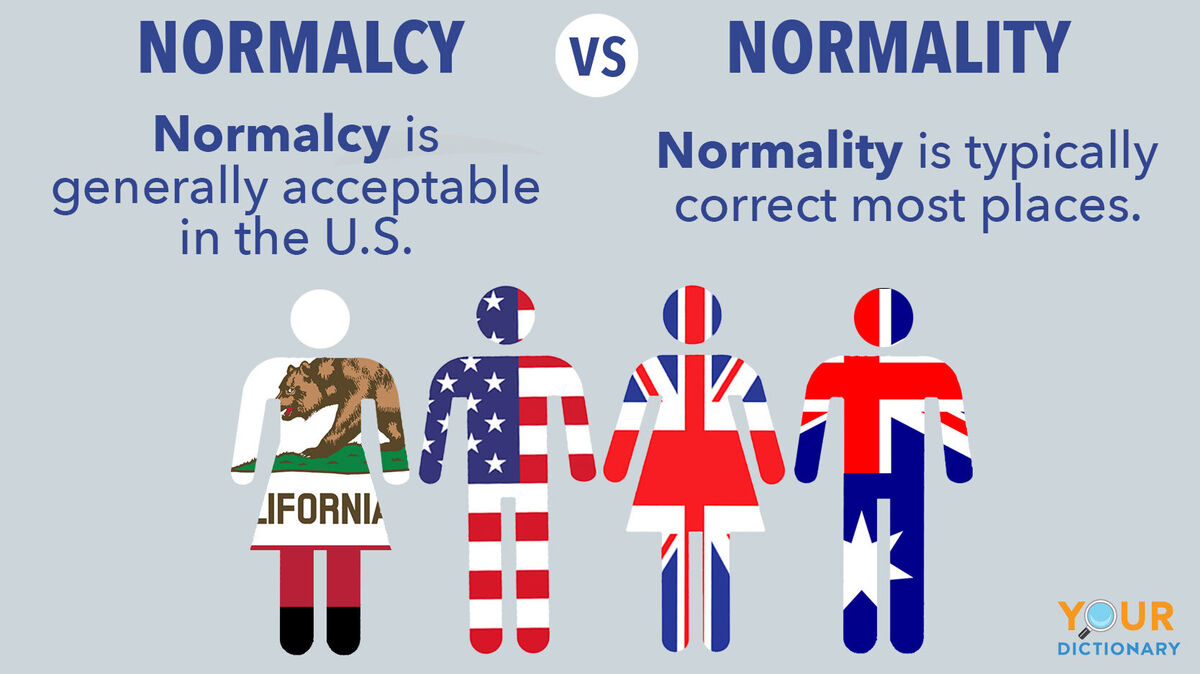
The words normalcy and normality are both noun forms of the adjective normal. These words mean the same thing, but one term is much more commonly used than the other. Discover what you need to know when deciding between normalcy vs. normality.
What Do Normalcy and Normality Mean?
The words normalcy and normality are defined as the state of how things usually are, under ordinary circumstances. When you're looking to describe how things are when nothing unusual or out of the ordinary is going on, the state you are describing could be called either normalcy or normality.
Normalcy vs. Normality: Geographic Preferences
Based on definition and grammar (part of speech), the words normalcy and normality are essentially interchangeable. However, preferences vary from U.S. English to British English with regards to which word is best to use.
- In the U.K., Australia and Canada, normality is commonly accepted, while normalcy is not generally considered appropriate.
- In the United States (U.S.), either word (normality or normalcy) is acceptable. People usually choose the term that flows best in the overall statement.
Which Term Is Typically Correct?
If you want to go with the more commonly used and widely accepted term, you should use the word normality. However, if you're writing or speaking to an American audience, you can opt to use normalcy if you prefer. Of course, you might find it best to stick with the more universally accepted word regardless of location. If so, normality is the best option.
Normalcy vs. Normality: A Historical Perspective
The word normality has been used a lot longer throughout history than normalcy. There is evidence that both words existed as far back as the 1800s, so neither word is a recent addition to the English language. However, normality became commonly used for a very long time before normalcy became part of the vernacular.
Normalcy: Increased Usage After 1920
The word normalcy started getting a lot of attention in America in 1920 when soon-to-be-president Warren G. Harding used the term in his famous Return to Normalcy speech. Harding delivered this speech in May of 1920 as part of his successful campaign for president. He emphasized his belief that America was ready for a return to normalcy. According to Google ngram, the word normalcy hardly appeared in published books at all prior to 1920 but picked up after that time.
Normality Remains the Norm
Even though there was a spike in the usage of normalcy around 1920 and usage continued to grow over time, with some ups and downs, the term did not overtake normality with regards to frequency of usage in published works. The word normality still tends to be used more commonly than the word normalcy, likely because it is typically not considered a good option outside of the US. Some consider normality to be more formal than normalcy, which may account for why normality tends to be used so more often.
Alternate Word: Normalness
The word normalness is another noun form of normal that means the same thing as normalcy and normality. This term is not commonly used at all. Technically it would not be incorrect to use it interchangeably with normalcy or normality. However, since the word is used so rarely, chances are that some readers and/or listeners will perceive the term as an error. It's best to choose between normality vs. normalcy or to select another suitable synonym.
Synonyms and Related Words
If you're concerned that some people might question your choice when you use normality or normalcy, you could opt to instead substitute a synonym into your sentence. There are quite a few options to consider.
- conventional times
- ordinary circumstances
- ordinary scenario
- ordinary situation
- regular circumstances
- regular situation
- regular circumstances
- standard circumstances
- standard scenario
- standard situation
- the status quo
- usual circumstances
- usual scenario
- usual situation
Example Sentences Using Normalcy and Normality
Explore these example sentences for more insights into how the words normalcy and normality can be used.
- I'm not even sure what normality looks like anymore.
- When will things return to a sense of normalcy following the pandemic?
- Following a hurricane, it may be weeks before there is a return to normality.
- After living out of boxes during the renovation, it'll be nice to have some normalcy at home.
- Will there be a return to normality now that there has been a change in leadership?
- After the toxic manager departed, the team returned to a sense of normalcy.
- I don't like drama. I'd rather live in a constant state of normality.
- After dealing with a tumultuous relationship, I'm now looking forward to a bit of normalcy in my life.
- I've been living out of boxes so long now that doing so is just part of my everyday normality.
- Once we install the new computer system, we should see a return to normalcy in the workflow.
Beyond Forms of Normal
Now that you know how to choose between the noun forms of the word normal, you're ready to make wise decisions about incorporating these terms into your writing and conversations. If you often find yourself struggling to decide between similar words (as many people do!), you may want to explore some other commonly confused words. You might start with similar words that are interchangeable like preventative vs. preventive. That way, you'll be prepared to make the right decision the next time you face a challenging word usage conundrum.